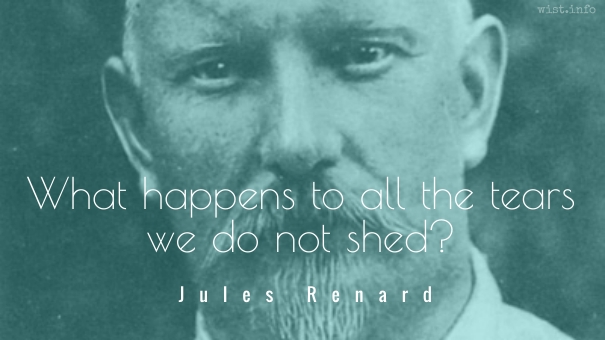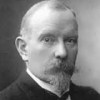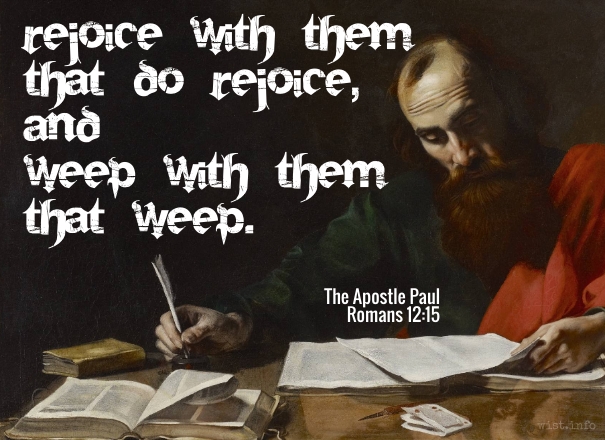But the power
of a man’s will is often powerless:
laughter and tears follow so close upon
the passions that provoke them that the more
sincere the man, the less they obey his will.
[Ma non può tutto la virtù che vuole;
ché riso e pianto son tanto seguaci
a la passion di che ciascun si spicca,
che men seguon voler ne’ più veraci.]Dante Alighieri (1265-1321) Italian poet
The Divine Comedy [Divina Commedia], Book 2 “Purgatorio,” Canto 21, l. 105ff (21.105-108) (1314) [tr. Musa (1981)]
(Source)
(Source (Italian)). Alternate translations:
As each alternate Passion leaves a trace
On the still-varying muscles of the face,
Fictitious oft; but, by the candid mind,
Conceal'd with pain, the dawn of dubious joy
My features wore.
[tr. Boyd (1802), st. 20]
But the power which wills,
Bears not supreme control: laughter and tears
Follow so closely on the passion prompts them,
They wait not for the motions of the will
In natures most sincere.
[tr. Cary (1814)]
But will is not with power entire endued.
Laughter and tears pursue so much the trace
The passion dictates that imprints them there,
Nor follow will in natures most sincere.
[tr. Bannerman (1850)]
But yet the power that wills cannot do all things;
For tears and laughter are such pursuivants
Unto the passion from which each springs forth,
In the most truthful least the will they follow.
[tr. Longfellow (1867)]
But virtue cannot all it would; for laughter and tears follow so much the passion from which each springs, that they least obey will in the most truthful men.
[tr. Butler (1885)]
But all it wishes, will cannot forbear:
For smiles and tears to diverse passion wed,
Upon that passion follow so instinct.
In open natures, will is quite outsped.
[tr. Minchin (1885)]
But the power that wills cannot do everything; for smiles and tears are such followers on the emotion from which each springs, that in the most truthful they least follow the will.
[tr. Norton (1892)]
But the virtue which wills is not all powerful;
for laughter and tears follow so closely the passion from which each springs, that they least obey the will in the most truthful.
[tr. Okey (1901)]
But the power to will cannot do all, for laughter and tears are so close followers on the passions from which they spring that they least follow the will in the most truthful.
[tr. Sinclair (1939)]
But all is not done by the will's decree;
For on the passion wherefrom each is bred
Laughter and tears follow so close that least
In the most truthful is the will obeyed.
[tr. Binyon (1943)]
But will with us is not made one with power;
Tears, laughter, tread so hard upon the heel
Of their evoking passions, that in those
Who're most sincere they least obey the will.
[tr. Sayers (1955)]
But man's will
is not supreme in every circumstance:
for tears and laughter come so close behind
the passions they arise from, that they least
obey the will of the most honest mind.
[tr. Ciardi (1961)]
But the power that wills cannot do everything; for smiles and tears are such close followers on the emotion from which each springs, that in the most truthful they least follow the will.
[tr. Singleton (1973)]
But virtue cannot do everything that it will;
For laughter and tears follow so closely on
The passions from which they respectively proceed,
That they follow the will least in the most truthful.
[tr. Sisson (1981)]
And yet the power of the will cannot do all,
for tears and smiles are both so faithful to
the feelings that have prompted them that true
feeling escapes the will that would subdue.
[tr. Mandelbaum (1982)]
But the power of the will cannot do everything,
for laughter and weeping follow so closely on the passion from which each springs that they follow the will least in those who are most truthful.
[tr. Durling (2003)]
But the virtue that wills is not all-powerful, since laughter and tears follow the passion, from which they spring, so closely, that, in the most truthful, they obey the will least.
[tr. Kline (2002)]
But will power can't do everything it wills.
For tears and laughter follow on so close
to those emotions from which each act springs
that these least follow will in those most true.
[tr. Kirkpatrick (2007)]
But the power that wills cannot do all it wills,
for laughter and tears so closely follow feelings
from which they spring, they least can be controlled
in those who are most truthful.
[tr. Hollander/Hollander (2007)]
But will alone won't stop a human being,
Since laughter and tears are deeply interwoven,
Following hard on emotions which spring them forth,
And when they're truthful have little to do with the will.
[tr. Raffel (2010)]
Quotations about:
tears
Note not all quotations have been tagged, so Search may find additional quotes on this topic.
What is the reason that we laugh so freely in a theatre but are ashamed to weep? Is it less natural to be melted by what excites pity than to burst into laughter at what is comical? […] It is not thought odd to hear a whole theatre ring with laughter at some passage of a comedy, but, on the contrary, it implies that it was funny, and very naturally performed; therefore the extreme restraint every one puts on himself not to shed tears and the affected laughter with which one tries to disguise them, clearly prove that the natural result of lofty tragedy should be to make us all weep without concealment and publicly, and without any other hindrance than wiping our eyes.
[D’où vient que l’on rit si librement au théâtre, et que l’on a honte d’y pleurer? Est-il moins dans la nature de s’attendrir sur le pitoyable que d’éclater sur le ridicule? […] Comme donc ce n’est point une chose bizarre d’entendre s’élever de tout un amphithéâtre un ris universel sur quelque endroit d’une comédie, et que cela suppose au contraire qu’il est plaisant et très naïvement exécuté, aussi l’extrême violence que chacun se fait à contraindre ses larmes, et le mauvais ris dont on veut les couvrir prouvent clairement que l’effet naturel du grand tragique serait de pleurer tous franchement et de concert à la vue l’un de l’autre, et sans autre embarras que d’essuyer ses larmes, outre qu’après être convenu de s’y abandonner.]
Jean de La Bruyère (1645-1696) French essayist, moralist
The Characters [Les Caractères], ch. 1 “Of Works of the Mind [Des Ouvrages de l’Esprit],” § 50 (1.50) (1688) [tr. Van Laun (1885)]
(Source)
(Source (French)). Alternate translations:
What's the reason that we laugh so freely, and are asham'd to weep at the Theatre? Is Nature less subjects to be soften'd by pity, than to burst forth at what is Comical? [...] We must suppose 'tis the natural effect of a good Tragedy, to make us Weep freely in sight of the whole Audience, without any other trouble than drying our Eyes, and wiping our Faces. It being no more ridiculous to be seen Weeping, than to be heard to Laugh by the whole Theatre: On the contrary, we then conclude there was something acted very pleasantly, and to the life; and the restraint a man puts on him∣self to hide his tears, by an affected Grimace, plainly demonstrates that he ought not to resist the main design of a Tragedy, but give way to his Passions, and discover em as openly, and with as much confidence, as at a Comedy.
[Bullord ed. (1696)]
What is the reason we laugh so freely, but are asham'd to weep at the Theatre? Is Nature less subject to be soften'd by Pity, than to burst out into Laughter at what is Comical? [...] As therefore 'tis thought no odd thing to hear the whole Amphitheatre ring with an Universal Laughter, at some passage of a Comedy; butr on the contrary, implies something was pleasantly said, and naturally perform';d; so the extreme violence which every one offers to himself in constraining his Tears, and disguising ;em with affected Grimaces, clealry prove that the Natural Effect of good Tragedy is to make us weep with all freedom, and in concert, in another's sight, and wihtout any other disturbance than wiping our Eyes.
[Curll ed. (1713)]
Why is it that we laugh so freely at the theatre and yet are ashamed to weep there? Is it less natural to be moved by what is pitiful than to be amused by what is ridiculous? [...] Since then it is no unusual thing to hear a whole theatre break into unanimous laughter at some passage in a comedy, since this implies, on the contrary, that it is amusing and extremely life-like, so the extreme violence we do to our feelings by restraining our tears, and the false laughter with which we try to conceal them, clearly proves that the natural effect of great tragedy should be to make us all weep quite openly, with one accord, in one another’s presence, with no further concern than to wipe our eyes.
[tr. Stewart (1970), "Of Books"]
Cry with me;
for sharing tears with others is relief in hardship.[συνάλγησον, ὡς ὁ κάμνων
δακρύων μεταδοὺς ἔχει
χουφότητα μόχϑων.]Euripides (485?-406? BC) Greek tragic dramatist
Andromeda [Ἀνδρομέδα], Frag. 119 (TGF) (412 BC)
(Source)
(Source (Greek)). Alternate translation.
Come, let us weep together; for the unhappy
Find social tears their poignant griefs assuage.
[tr. Wodhull (1809)]
She heard him mutter, “Can you take away this grief?”
“I’m sorry,” she replied. “Everyone asks me. And I would not do so even if I knew how. It belongs to you. Only time and tears take away grief; that is what they are for.”Terry Pratchett (1948-2015) English author
I Shall Wear Midnight (2010)
(Source)
Roland and Tiffany.
Rejoice with them that do rejoice, and weep with them that weep.
The Bible (The New Testament) (AD 1st - 2nd C) Christian sacred scripture
Romans 12:15 [KJV]
Quoting 12:15-18: "Rejoice with those who rejoice, and weep with those who weep. Be of the same mind toward one another; do not be haughty in mind, but associate with the lowly Do not be wise in your own estimation. Never pay back evil for evil to anyone Respect what is right in the sight of all men. If possible, so far as it depends on you, be at peace with all men."
He who walks through a great city to find subjects for weeping, may, God knows, find plenty at every corner to wring his heart; but let such a man walk on his course, and enjoy his grief alone — we are not of those who would accompany him. The miseries of us poor earthdwellers gain no alleviation from the sympathy of those who merely hunt them out to be pathetic over them. The weeping philosopher too often impairs his eyesight by his woe, and becomes unable from his tears to see the remedies for the evils which he deplores. Thus it will often be found that the man of no tears is the truest philanthropist, as he is the best physician who wears a cheerful face, even in the worst of cases.
Waste not fresh tears over old griefs.
Euripides (485?-406? BC) Greek tragic dramatist
Alexander [Ἀλέξανδρος], Frag. 44 (TGF) [Chorus?] (415 BC) [tr. Morgan]
(Source)











